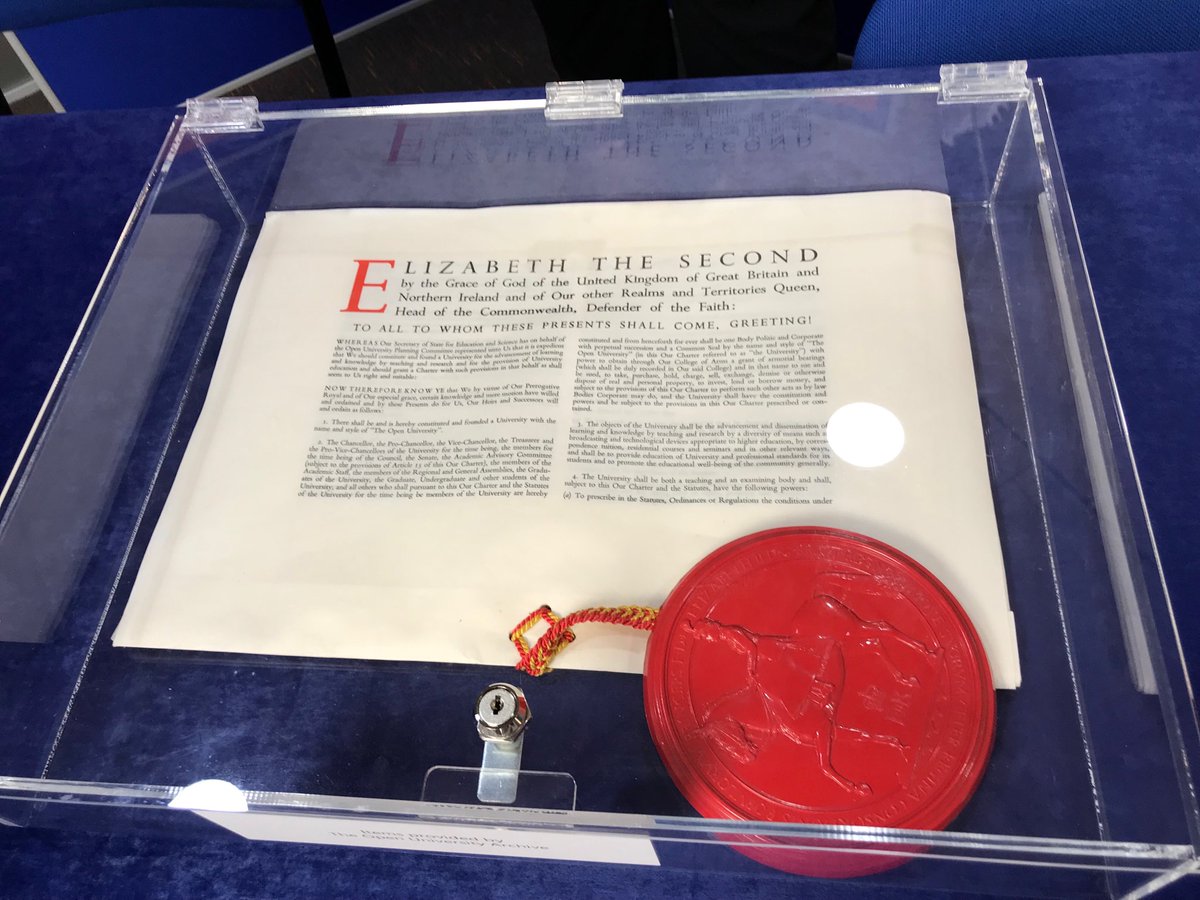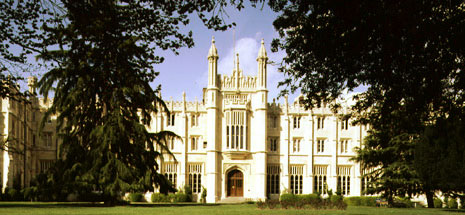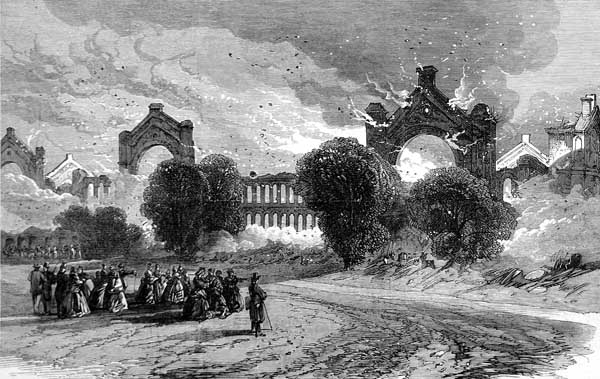|
Open University
The Open University (OU) is a British Public university, public research university and the largest university in the United Kingdom by List of universities in the United Kingdom by enrolment, number of students. The majority of the OU's undergraduate students are based in the United Kingdom and principally study off-campus; many of its courses (both undergraduate and postgraduate education, postgraduate) can also be studied anywhere in the world. There are also a number of full-time postgraduate research students based on the 48-hectare university campus in Milton Keynes, where they use the OU facilities for research, as well as more than 1,000 members of academic and research staff and over 2,500 administrative, operational and support staff. The OU was established in 1969 and was initially based at Alexandra Palace, north London, using the television studios and editing facilities which had been vacated by the BBC. The first students enrolled in January 1971. The university a ... [...More Info...] [...Related Items...] OR: [Wikipedia] [Google] [Baidu] |
Public University
A public university or public college is a university or college that is in owned by the state or receives significant public funds through a national or subnational government, as opposed to a private university. Whether a national university is considered public varies from one country (or region) to another, largely depending on the specific education landscape. Africa Egypt In Egypt, Al-Azhar University was founded in 970 AD as a madrasa; it formally became a public university in 1961 and is one of the oldest institutions of higher education in the world. In the 20th century, Egypt opened many other public universities with government-subsidized tuition fees, including Cairo University in 1908, Alexandria University in 1912, Assiut University in 1928, Ain Shams University in 1957, Helwan University in 1959, Beni-Suef University in 1963, Zagazig University in 1974, Benha University in 1976, and Suez Canal University in 1989. Kenya In Kenya, the Ministry o ... [...More Info...] [...Related Items...] OR: [Wikipedia] [Google] [Baidu] |
Campus
A campus is traditionally the land on which a college or university and related institutional buildings are situated. Usually a college campus includes libraries, lecture halls, residence halls, student centers or dining halls, and park-like settings. A modern campus is a collection of buildings and grounds that belong to a given institution, either academic or non-academic. Examples include the Googleplex and the Apple Campus. Etymology The word derives from a Latin word for "field" and was first used to describe the large field adjacent Nassau Hall of the College of New Jersey (now Princeton University) in 1774. The field separated Princeton from the small nearby town. Some other American colleges later adopted the word to describe individual fields at their own institutions, but "campus" did not yet describe the whole university property. A school might have one space called a campus, another called a field, and still another called a yard. History The tradition of ... [...More Info...] [...Related Items...] OR: [Wikipedia] [Google] [Baidu] |
Educational Accreditation
Educational accreditation is a quality assurance process under which services and operations of educational institutions or programs are evaluated and verified by an external body to determine whether applicable and recognized standards are met. If standards are met, accredited status is granted by the appropriate agency. In most countries, the function of educational accreditation is conducted by a government organization, such as the Ministry of Education. The United States government instead delegates the quality assurance process to private non-profit organizations. Those organizations are formally called accreditors. In order to receive federal funding and any other type of federal recognition, all accreditors in the US must, in turn, be recognized by the National Advisory Committee on Institutional Quality and Integrity (NACIQI), which is an advisory body to the U.S. Secretary of Education. The federal government is, therefore, still the top-level architect and controllin ... [...More Info...] [...Related Items...] OR: [Wikipedia] [Google] [Baidu] |
Richmond, The American International University In London
Richmond American University London is a private university in London, United Kingdom. Richmond was founded in 1972,by British educator Cyril Taylor. The university awards US degrees from the American state of Delaware, where Richmond is accredited by the Middle States Commission on Higher Education. Until 2018, Richmond's UK degrees were awarded by the Open University; but from the 2018/2019 academic year, Richmond has been able to grant its own UK degrees, after receiving Taught Degree Awarding Powers from the Quality Assurance Agency for Higher Education. This mean that all students at Richmond gain both a UK and US degree studying one programme. History Richmond was founded in 1972 by the social entrepreneur and politician Cyril Taylor, chairman of the American Institute For Foreign Study (AIFS), as Richmond College, The American College in London. It began teaching on the site of the former Richmond Theological College, part of the University of London, founded in 18 ... [...More Info...] [...Related Items...] OR: [Wikipedia] [Google] [Baidu] |
World's Largest Universities
The following is a list of largest universities in the world by country listing only the largest university in each country. This is not a list of largest individual campuses with in-person (non-distance) enrollment. This list includes distance enrollment and multiple-campus institutions. List of universities See also *List of largest universities by enrollment *List of the largest United States colleges and universities by enrollment This is a list of the largest United States colleges and universities by enrollment for colleges and universities in the United States. What this list includes: * Colleges and universities within the United States * University systems if the s ... References {{Reflist * Lists of education-related superlatives ... [...More Info...] [...Related Items...] OR: [Wikipedia] [Google] [Baidu] |
UK Parliament
The Parliament of the United Kingdom is the supreme legislative body of the United Kingdom, the Crown Dependencies and the British Overseas Territories. It meets at the Palace of Westminster, London. It alone possesses legislative supremacy and thereby ultimate power over all other political bodies in the UK and the overseas territories. Parliament is bicameral but has three parts, consisting of the sovereign ( King-in-Parliament), the House of Lords, and the House of Commons (the primary chamber). In theory, power is officially vested in the King-in-Parliament. However, the Crown normally acts on the advice of the prime minister, and the powers of the House of Lords are limited to only delaying legislation; thus power is ''de facto'' vested in the House of Commons. The House of Commons is an elected chamber with elections to 650 single-member constituencies held at least every five years under the first-past-the-post system. By constitutional convention, all gov ... [...More Info...] [...Related Items...] OR: [Wikipedia] [Google] [Baidu] |
Continuing Education
Continuing education (similar to further education in the United Kingdom and Ireland) is an all-encompassing term within a broad list of post-secondary learning activities and programs. The term is used mainly in the United States and Canada. Recognized forms of post-secondary learning activities within the domain include: degree credit courses by non-traditional students, non-degree career training, college remediation, workforce training, and formal personal enrichment courses (both on-campus and online). General continuing education is similar to adult education, at least in being intended for adult learners, especially those beyond traditional undergraduate college or university age. Frequently, in the United States and Canada continuing education courses are delivered through a division or school of continuing education of a college or university known sometimes as the university extension or extension school. The Organisation for Economic Co-operation and Development a ... [...More Info...] [...Related Items...] OR: [Wikipedia] [Google] [Baidu] |
Academic Certificate
An academic certificate is a document that certifies that a person has received specific education or has passed a test or series of tests. In many countries, a certificate is a qualification attained in secondary education. For instance, students in the Republic of Ireland sit the Junior Certificate and follow it with the Leaving Certificate. Similarly, other countries have awards, for instance, in Australia the Higher School Certificate (HSC) in New South Wales, the Victorian Certificate of Education (VCE) in Victoria, etc., is the examination taken on completion of secondary education. In parts of the United Kingdom the General Certificate of Secondary Education (GCSE) is the normal examination taken at age 16 and the General Certificate of Education (GCE) Advanced Subsidiary Level (AS-level) and Advanced Level (A-levels) are taken at 17 and 18. In many other countries, certificates are qualifications in higher education. For example, in the Republic of Ireland, the ... [...More Info...] [...Related Items...] OR: [Wikipedia] [Google] [Baidu] |
Diploma
A diploma is a document awarded by an educational institution (such as a college or university) testifying the recipient has graduated by successfully completing their courses of studies. Historically, it has also referred to a charter or official document of diplomacy. The diploma (as a document certifying a qualification) may also be called a testamur, Latin for "we testify" or "certify" (testari), so called from the word with which the certificate begins; this is commonly used in Australia to refer to the document certifying the award of a degree. Alternatively, this document can simply be referred to as a degree certificate or graduation certificate, or as a parchment. The certificate that a Nobel laureate receives is also called a diploma. The term diploma is also used in some historical contexts, to refer to documents signed by a King affirming a grant or tenure of specified land and its conditions (see Anglo-Saxon Charters and Diplomatics). Usage Australia In Austr ... [...More Info...] [...Related Items...] OR: [Wikipedia] [Google] [Baidu] |
Academic Degree
An academic degree is a qualification awarded to students upon successful completion of a course of study in higher education, usually at a college or university. These institutions commonly offer degrees at various levels, usually including undergraduate degrees, master's, and doctorates, often alongside other academic certificates and professional degrees. The most common undergraduate degree is the bachelor's degree, although in some countries there are lower level higher education qualifications that are also titled degrees (e.g. associate degrees and foundation degrees). History Emergence of the doctor's and master's degrees and the licentiate The doctorate (Latin: ''doceo'' "I teach") appeared in medieval Europe as a license to teach (Latin: ''licentia docendi'') at a medieval university. Its roots can be traced to the early church when the term "doctor" referred to the Apostles, church fathers and other Christian authorities who taught and interpreted the Bibl ... [...More Info...] [...Related Items...] OR: [Wikipedia] [Google] [Baidu] |
Walton Hall, Milton Keynes
Walton Hall is a district in Milton Keynes, in the English county of Buckinghamshire, and is the location of the campus and offices of The Open University. The university campus covers 48 hectares and the first buildings were designed by Maxwell Fry and Jane Drew in 1969. It is in the ancient ecclesiastic and modern civil parish of Walton. The manor house (Walton Hall) that gives the district its name and the ancient parish church of St Michael, now deconsecrated, are in the university's grounds. The village farm-lands are divided between Walton Hall, the modern Walton, Kents Hill and Walnut Tree. The manor house itself, built in 1830 in the Regency style for the Pinfold family, is home to the vice-chancellor's offices of the Open University. Walton Hall is on the banks of the Ouzel, a tributary of the Great Ouse where Walton Lake, a disused balancing lake, has become naturalised and is home to reeds, bulrushes, reed warbler, reed bunting, water rail, sparrowhawk, kestrel, ... [...More Info...] [...Related Items...] OR: [Wikipedia] [Google] [Baidu] |
Alexandra Palace
Alexandra Palace is a Grade II listed entertainment and sports venue in London, situated between Wood Green and Muswell Hill in the London Borough of Haringey. It is built on the site of Tottenham Wood and the later Tottenham Wood Farm. Originally built by John Johnson and Alfred Meeson, it opened in 1873 but following a fire two weeks after its opening, was rebuilt by Johnson. Intended as "The People's Palace" and often referred to as "Ally Pally", its purpose was to serve as a public centre of recreation, education and entertainment; North London's counterpart to the Crystal Palace in South London. At first a private venture, in 1900, the owners planned to sell it and Alexandra Park for development. A group of neighbouring local authorities managed to acquire it. An Act of Parliament created the Alexandra Palace and Park Trust. The Act required the trustees to maintain the building and park and make them available for the free use and recreation of the public forever. Th ... [...More Info...] [...Related Items...] OR: [Wikipedia] [Google] [Baidu] |








